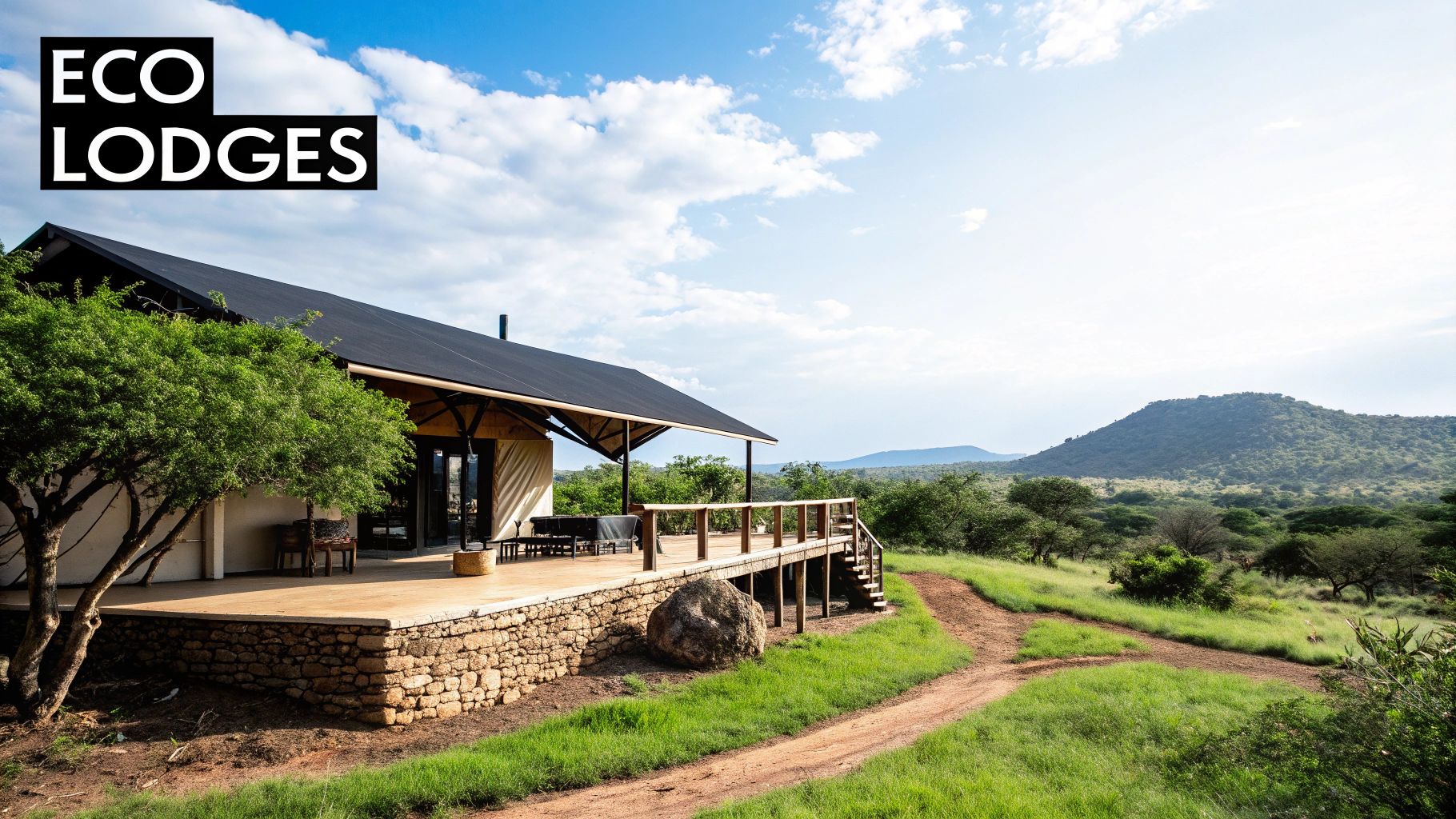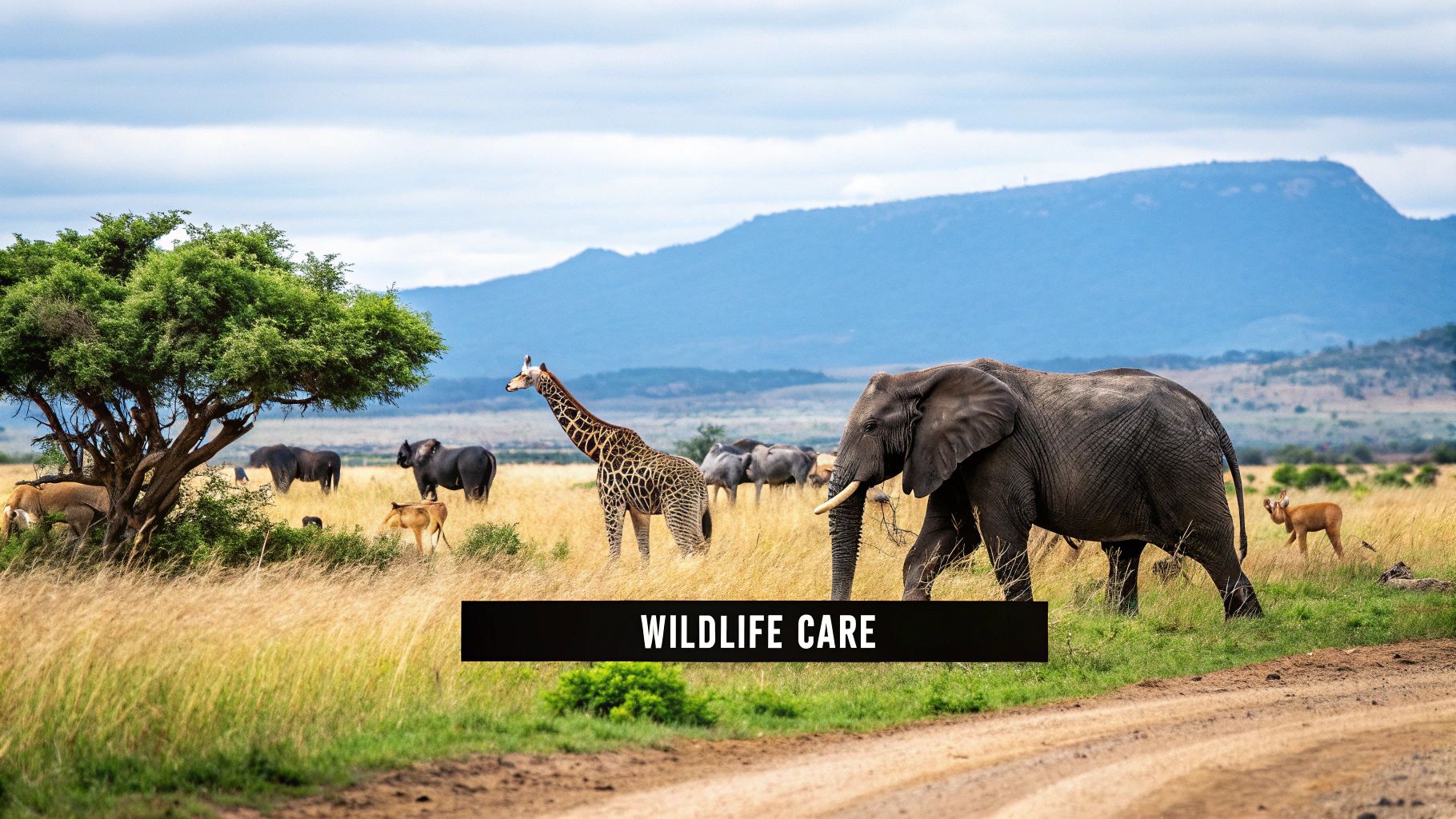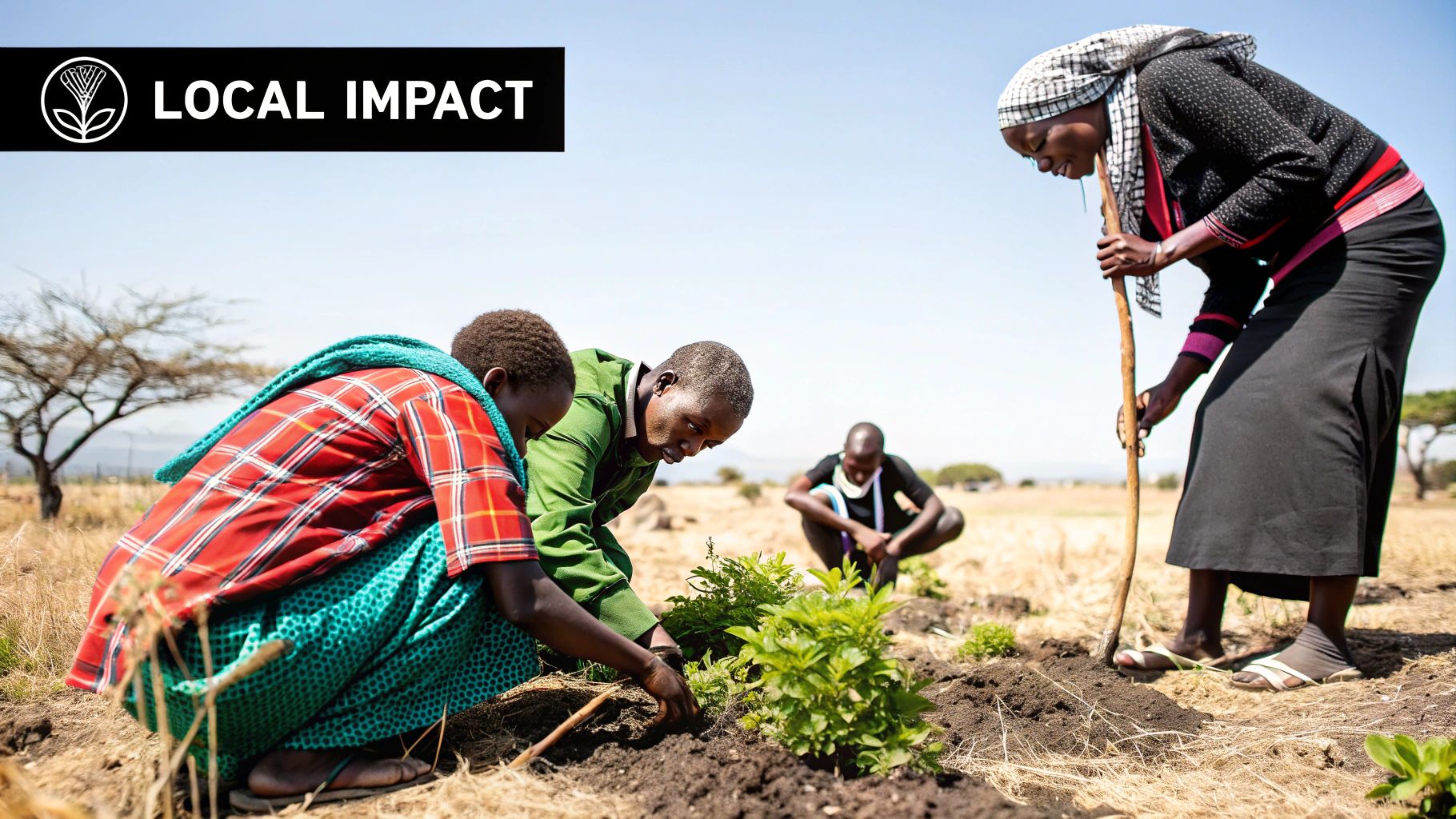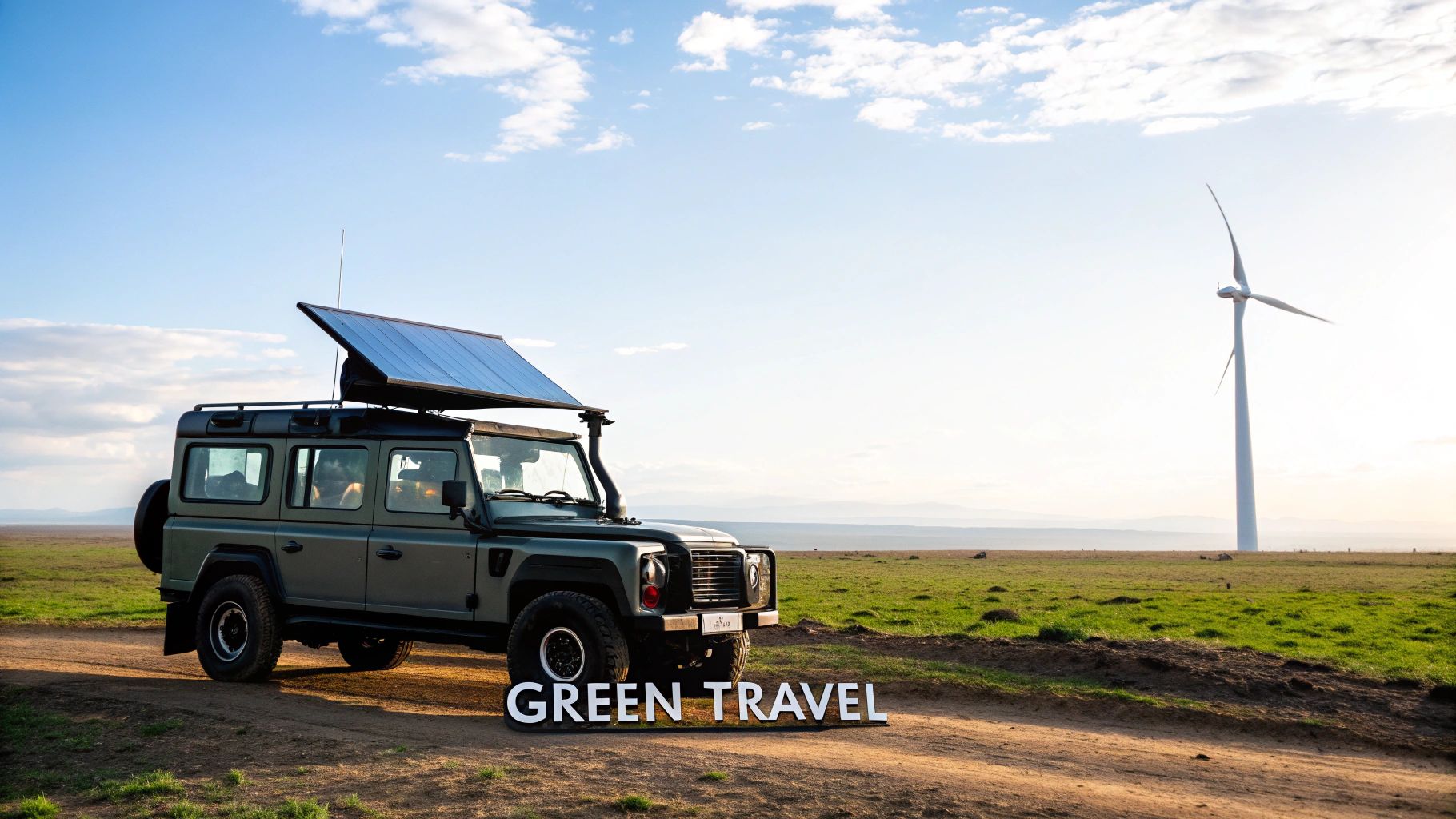Table of contents [Show]
- Beyond the Ordinary: What Makes a Safari Truly Sustainable
- Community Prosperity: The Real Economics of Ethical Safaris
- Conservation Success Stories: When Tourism Becomes a Lifeline
- Choosing Your Perfect Sustainable Safari Destination
- Minimizing Your Footprint: Practical Safari Sustainability Tips
- Packing with Purpose: Essential Choices for a Sustainable Safari
- Respecting Resources: Water and Energy Conservation on Safari
- Responsible Wildlife Viewing: Prioritizing Animal Welfare
- Supporting Conservation: Extending Your Impact Beyond the Safari
- Leaving a Positive Legacy: A Sustainable Safari Mindset
- The Future of Sustainable Safari: Innovations Changing the Game
Beyond the Ordinary: What Makes a Safari Truly Sustainable

A truly sustainable safari delves deeper than just observing wildlife. It's about a commitment to environmental protection, empowering local communities, and preserving cultural heritage. This ensures tourism benefits everyone involved, contributing to the long-term well-being of the ecosystem and its inhabitants. This differentiates true eco-tourism from simple "greenwashing."
The Pillars of a Sustainable Safari
Several core principles define a truly sustainable safari. Wildlife protection is crucial, with operators minimizing their impact on animal behavior and habitats.
This can include adhering to strict anti-poaching protocols and employing guides trained in responsible wildlife viewing. It also means supporting ongoing conservation initiatives.
Sustainable safaris also prioritize community empowerment. They provide jobs for locals, source goods and services locally, and respect indigenous cultures and traditions.
Environmental stewardship is another key element. This involves minimizing waste, conserving water and energy, and promoting responsible land management. Sustainable safari lodges often use eco-friendly design elements. These might include solar power, rainwater harvesting, and waste recycling programs. You might be interested in: Our tour sitemap.
Consumers are increasingly looking for experiences that align with their values. Interest in sustainable safaris has grown by over 1,000 percent in the last four years. This shows a shift toward eco-friendly and socially responsible travel. This trend reflects a desire for travel that benefits both the traveler and the destination. Find more detailed statistics here: 2024 Safari Travel Trends.
Not all safaris advertised as "sustainable" genuinely are. It's important for travelers to be discerning. Look for certifications from reputable organizations that verify sustainable practices.
Consider the safari operator’s commitment to the principles discussed above. Do they actively support local communities? Are they transparent about their conservation efforts? These are key questions to consider.
The Positive Impact of Responsible Tourism
Choosing a truly sustainable safari has a significant impact. It helps protect endangered species and preserve vital habitats. It also supports the economic well-being of local communities.
By making informed choices, travelers can contribute to a more sustainable future for wildlife and the planet. This involves supporting responsible operators who prioritize conservation and community well-being over profits. A sustainable safari is not just a trip; it's an investment in our planet’s future.
Community Prosperity: The Real Economics of Ethical Safaris

Sustainable safaris offer travelers an unforgettable adventure. But they also provide something more: a significant boost to the economic well-being of local communities. These ethical operations focus on empowering local people, fostering a more equitable and beneficial approach to tourism. Instead of simply extracting resources, they invest in the future.
Creating Meaningful Employment
Sustainable safaris create jobs, directly contributing to community prosperity. Local people are hired as guides, hospitality staff, and support personnel. This not only provides much-needed income but also builds valuable job skills within the community.
Sustainable safaris also frequently support local businesses. By sourcing goods and services from local vendors, they create a ripple effect of economic growth, boosting the entire area.
Supporting Indigenous Enterprises
Many sustainable safari destinations are located near areas rich in indigenous culture. Ethical safari operators understand the importance of supporting these communities. They often partner with local artisans and craftspeople, creating a market for their unique products.
This partnership helps preserve important cultural heritage. For instance, some safaris allow guests to buy authentic handicrafts directly from local artisans. This guarantees fair prices for the artisans and provides guests with a meaningful cultural exchange.
Transparent Revenue Sharing: A Path To Empowerment
Transparent revenue sharing sets sustainable safaris apart. Traditional models often see profits flowing to outside investors. Ethical operations, however, ensure that a significant portion of revenue directly supports local development projects.
This funding supports vital community needs like education, healthcare, and infrastructure. These investments directly improve the quality of life for residents.
The global safari tourism market is booming, offering opportunities for both traditional and sustainable models. In 2023, the market was valued at USD 34.62 billion. It's expected to grow at a 6.1% CAGR until 2030. Growing demand for sustainable travel is further fueling the expansion of ethical safaris. Learn more about this dynamic market in the Safari Tourism Market Report.
To illustrate the economic impact of sustainable safaris versus traditional safaris, let's examine a comparison table showcasing some key differences.
Investing in the Future: Beyond Tourism
Sustainable safaris look beyond short-term economic gains. They invest in the long-term well-being of communities. By supporting education and healthcare, they empower the next generation. By funding infrastructure development, they create a stronger foundation for local economies. This approach ensures that the positive impact of tourism lasts long after the visitors have departed, creating a brighter and more prosperous future for everyone.

When planned with care, a sustainable safari can be a powerful tool for conservation. This section explores inspiring stories of wildlife recovery, fueled by responsible tourism. These examples show how tourist dollars, when used effectively, can protect endangered species and their habitats.
From Poaching Hotspots to Protected Havens
In many regions, the presence of tourists has significantly reduced poaching. The steady flow of visitors acts as a natural deterrent to illegal hunting. This makes areas previously vulnerable to poachers safer for wildlife.
The revenue generated from sustainable safaris also allows for greater investment in anti-poaching patrols and other security measures. This increased security further strengthens the protection of vulnerable wildlife populations.
For example, some safari operators partner with local communities and law enforcement to create anti-poaching units. These units are specially trained and equipped to protect wildlife, ensuring the survival of threatened species.
Innovative Partnerships for Conservation
Sustainable safari operators frequently collaborate with research organizations. These partnerships lead to innovative conservation strategies, including habitat restoration and species monitoring programs. This collaborative approach maximizes the positive impact on wildlife and their environments.
One example is the use of GPS tracking to monitor animal movements and identify essential habitat areas. This data informs targeted conservation plans. Safari operators also invest in reforestation projects and support initiatives to reduce human-wildlife conflict.
Economic Alternatives to Wildlife Exploitation
Sustainable tourism offers communities alternative income sources. These alternatives replace activities like poaching or the illegal wildlife trade. This shift in economic incentives is crucial for long-term conservation success.
Communities are motivated to protect wildlife when they recognize its value as a tourism asset. Some communities have established community-based conservancies. They manage wildlife and tourism themselves, ensuring both economic and ecological benefits. You might be interested in: Our latest news.
Building Local Advocacy for Conservation
Sustainable safaris cultivate a sense of ownership and pride in local wildlife. This creates strong advocates for conservation within communities. People who benefit directly from tourism are more inclined to protect the resources that support it.
This heightened awareness translates into stronger local support for conservation initiatives. Communities actively participate in protecting their natural heritage. They play a crucial role in ensuring the long-term survival of endangered species.
Tangible Evidence of Positive Impact
These conservation success stories provide concrete proof that sustainable safaris can create meaningful change. By selecting responsible safari experiences, travelers can directly support the protection of endangered species.
These examples show how well-planned tourism can help endangered species recover. They demonstrate the power of responsible travel to create positive change and offer hope for a future where wildlife and communities flourish together.
Choosing Your Perfect Sustainable Safari Destination

Not all sustainable safaris are created equal. Each destination offers a unique blend of wildlife, conservation initiatives, and community engagement. Choosing the right one is key to maximizing both your enjoyment and positive impact. This guide will help you navigate the important factors to consider.
Aligning Your Interests and Values
Think about what you want to see. Are you a big cat enthusiast or more interested in endangered primates? Different regions specialize in different species.
Consider your preferred style of accommodation, too. Do you envision yourself in a luxury eco-lodge or are you comfortable with more rustic options? Some destinations offer a broader range of choices.
Finally, research the destination's ethical credentials. Do their conservation efforts prioritize habitat preservation, anti-poaching initiatives, or community development? This ensures your trip contributes to responsible tourism.
Exploring Regional Differences
Safari regions across Africa offer distinct experiences. East Africa is famous for the Great Migration, a phenomenal wildlife spectacle. Southern Africa, on the other hand, boasts a striking variety of ecosystems, from deserts to wetlands, supporting a rich diversity of species.
Regional differences go beyond wildlife. Conservation challenges and community involvement vary significantly. Some areas face human-wildlife conflict, while others focus on empowering local communities through tourism. You might be interested in: Our location sitemap.
The Impact of Seasonality
Wildlife viewing opportunities shift dramatically with the seasons. The dry season concentrates animals around water sources, making them easier to spot. The wet season, however, brings lush vegetation and newborn animals, offering a different kind of magic.
Understanding these seasonal changes is crucial for planning. You can choose the best time to visit based on your wildlife interests and anticipate weather conditions accordingly.
Discovering Hidden Gems
While popular destinations offer incredible experiences, don't overlook lesser-known areas. These hidden gems often offer a more intimate safari experience, with fewer crowds.
Your visit can have a significant impact in less-traveled regions. Your tourism dollars directly support emerging conservation efforts and local economies. This creates a more meaningful and impactful travel experience.
The following table compares several sustainable safari destinations, highlighting their key features:
Top Sustainable Safari Destinations ComparisonComparing different safari destinations based on conservation efforts, community involvement, and visitor experience
| Destination | Conservation Focus | Community Involvement | Best Time to Visit | Unique Experience |
|---|---|---|---|---|
| Maasai Mara, Kenya | Wildlife conservation & anti-poaching | Maasai community partnerships; cultural tourism | July-October (dry season) | Witness the Great Migration |
| Kruger National Park, South Africa | Biodiversity conservation; anti-poaching | Local community employment; sustainable tourism initiatives | May-September (dry season) | Diverse wildlife sightings in varied ecosystems |
| Okavango Delta, Botswana | Wetland conservation; sustainable tourism | Community-based tourism projects; local guides | June-October (dry season) | Unique water-based safaris |
| Volcanoes National Park, Rwanda | Gorilla conservation; habitat preservation | Community benefit sharing; guided treks | June-September & December-February (dry seasons) | Gorilla trekking experiences |
| South Luangwa National Park, Zambia | Wildlife conservation; walking safaris | Community partnerships; local guides | May-October (dry season) | Immersive walking safaris |
This table provides a starting point for researching different safari destinations and choosing one that aligns with your interests and values.
Making Informed Choices for Maximum Impact
Choosing a sustainable safari destination is a multi-layered decision. By considering your interests, comfort level, and ethical priorities, you can tailor your experience for maximum enjoyment and positive contribution.
Remember to research regional differences, understand seasonal patterns, and consider venturing off the beaten path. This empowers you to make informed choices that benefit both you and the incredible ecosystems you visit. With careful planning, your sustainable safari can be an unforgettable adventure that supports both wildlife and local communities.
Minimizing Your Footprint: Practical Safari Sustainability Tips
Even the most eco-conscious safari lodges rely on their guests to minimize their environmental impact. Thinking about sustainability begins before you depart and continues after you return home. By following these practical tips, you can ensure a positive impact during your sustainable safari.
Packing with Purpose: Essential Choices for a Sustainable Safari
The first step towards a sustainable safari is packing the right gear. Choose reusable water bottles and coffee cups to reduce plastic waste. Also, select biodegradable toiletries and sunscreen to protect the delicate ecosystems. For example, bar soap and shampoo are great alternatives to plastic bottles.
Your clothing choices matter too. Opt for neutral-colored clothing that blends with the surroundings and avoids disturbing wildlife. Lightweight, quick-drying fabrics are also a practical choice. This respects both the animals and local cultural norms.
Respecting Resources: Water and Energy Conservation on Safari
Water is a valuable resource in many safari destinations. Be mindful of your water usage by taking shorter showers and reusing towels. Be aware of your energy consumption as well. Turn off lights and air conditioning when you leave your room. These small actions can make a significant difference.
Responsible Wildlife Viewing: Prioritizing Animal Welfare
Prioritize animal welfare while on safari. Maintain a safe distance from wildlife, and avoid making loud noises or sudden movements that could cause them stress. This means resisting the urge to get too close for that perfect photo opportunity. Remember, you're a visitor in their natural habitat.
Support responsible tour operators who prioritize animal well-being over close encounters. These operators adhere to ethical wildlife viewing guidelines. This ensures your safari experience minimizes disruption to the natural environment.
Supporting Conservation: Extending Your Impact Beyond the Safari
Your commitment to sustainability continues even after your safari ends. Consider supporting conservation organizations that work in the region. You can donate to their projects or raise awareness about their efforts. Purchasing locally made crafts, for example, directly benefits the community and helps preserve their cultural heritage.
Share your sustainable safari experience with others. Encourage them to make responsible travel choices. Inspiring others can help reduce their environmental footprint and support conservation efforts. You might be interested in: Our other site resources.
Leaving a Positive Legacy: A Sustainable Safari Mindset
A sustainable safari is more than just a trip; it's a commitment to responsible travel. By packing mindfully, conserving resources, respecting wildlife, and supporting conservation efforts, you can make a real difference. This ensures your safari adventure leaves a positive legacy for both the environment and the local communities. It also creates a much more enriching and meaningful travel experience.
The Future of Sustainable Safari: Innovations Changing the Game
The world of sustainable safaris is constantly evolving. New approaches and technologies are reshaping how we protect wildlife and empower local communities. This look ahead explores how these innovations are creating more impactful safaris and richer experiences for travelers who care about conservation.
Technology's Role in Conservation
Technology is playing a key role in boosting conservation efforts. AI-powered anti-poaching systems, using sophisticated algorithms, are predicting poaching hotspots and alerting rangers to potential threats. This proactive approach helps protect vulnerable wildlife by preventing poaching before it happens.
Non-invasive wildlife monitoring is another exciting area of development. Drones and camera traps equipped with AI are tracking animal movements and gathering crucial data without disturbing natural behaviors. This information helps researchers understand animal populations and make informed conservation decisions. Learn more in our article about hotel listings.
Digital tools also connect travelers directly with conservation projects. Some safari operators offer interactive platforms where guests can track wildlife sightings, contribute to citizen science projects, and donate to specific conservation initiatives. This fosters a deeper sense of connection and allows travelers to actively participate in protecting wildlife.
Sustainable safari lodges are setting new standards for eco-friendly design. New lodges incorporate innovative features that minimize environmental impact while maximizing guest comfort.
- Solar power and rainwater harvesting reduce reliance on traditional energy and water sources.
- Waste recycling programs minimize waste.
- Locally sourced building materials reduce transportation emissions and support local economies.
These next-generation lodges prove that sustainability and luxury can coexist. They offer immersive safari experiences without compromising environmental integrity.
Rethinking Ownership: Community-Based Models
Community ownership models are changing the economic landscape of safari tourism. Some safari operations are transferring ownership or management directly to local communities. This ensures that tourism revenue directly benefits those most connected to the land.
This empowering approach creates economic opportunities, encourages local stewardship of natural resources, and ensures tourism contributes to long-term community well-being. It's a significant shift away from traditional models, where profits often went to outside investors.
Building Climate Resilience
Climate change is a significant threat to African wildlife and ecosystems. Sustainable safari operators are taking proactive steps to build climate resilience into their conservation strategies.
- Restoring degraded habitats to enhance biodiversity and ecosystem stability.
- Implementing water management strategies to adapt to changing rainfall patterns.
- Supporting community-based conservation initiatives that empower local people to manage natural resources sustainably.
These forward-thinking approaches recognize the crucial role of sustainable tourism in mitigating the impacts of climate change and protecting Africa’s biodiversity for future generations.
Ready for a truly meaningful adventure? Book your sustainable safari with Maximum Adventure Trails today and experience the future of responsible travel. Explore our incredible safari experiences!

